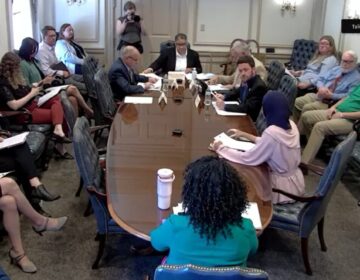Romney campaign twists Obama proposal for flexibility on welfare programs
New ads by the Mitt Romney campaign charge that President Barack Obama is gutting welfare reform.
The administration has proposed changes to policies. Locally, those who work with the recipients of government benefits say those changes could cut through cumbersome regulations and help their clients become self-sufficient.
The Romney ads give the proposal a different spin entirely.
“Under Obama’s plan, you wouldn’t have to work, and wouldn’t have to train for a job,” claims one of the ads. “They just send you your welfare check. And welfare-to-work goes back to being plain old welfare.”
Independent fact-checking organizations have rated the claim as inaccurate.
Local administrators say the changes may represent an opportunity to make back-to-work efforts more effective.
The term “welfare-to-work” comes from Clinton-era welfare reforms approved in Congress by a bipartisan coalition. The Obama administrative initiative offers waivers to states that propose innovative ways of handling participation in required work activities. It does not remove requirements that recipients look for work or job training.
Neither Pennsylvania nor Delaware officials have decided whether to apply for the waivers. New Jersey officials could not immediately address that state’s position.
But there’s a virtual consensus, among those who administer local programs, that rigid federal requirements and paperwork have become a burden.
Potential impacts of changes
Mark Edwards, head of Philadelphia Works, Inc., says very specific timelines for job-seekers to perform certain activities — say, looking for jobs on the Internet — can keep people out of desirable training programs.
“In health care, or in customer service, or in the insurance industry, medical billing, there are certain credentials that each industry has,” he said. “Those [training programs] have a tendency to be longer in nature.”
Edwards believes the new guidelines should allow more people to get valuable certifications.
Pennsylvania Department of Labor and Industry Secretary Julia Hearthway said that, in general, the state has talks with the U.S. officials about creating more flexibility in jobs programs.
“Federal regulations and who reports the funding streams of each of them can be pretty convoluted,” she said. “Now, having said that, the feds are working with us to make this a little more seamless.”
The state Department of Public Welfare administers the Temporary Assistance for Needy Families program for struggling families.
Spokeswoman Donna Morgan responded to questions with one-sentence a statement: “We are still analyzing the impact of the waiver, but the department feels that work requirements are a cornerstone of the TANF program.”
Edwards says he doesn’t buy the argument that the Obama administration changes would weaken accountability. The plan would require states to increase the number of people they send to jobs.
He does have a somewhat related concern.
“The inherent nature of a pilot is that you try something and you might try it and it will fail — and so the question is how will the federal government treat situations where the state exercises a good effort,” he said.
And of course, what qualifies as a good effort is always subjective.
Advocates for the needy believe Pennsylvania has already been too aggressive in pushing people into jobs that aren’t a good fit or pay very little.
It’s unclear whether the controversy in the presidential campaign will affect the way states respond to the initiative, and how their programs function.
WHYY is your source for fact-based, in-depth journalism and information. As a nonprofit organization, we rely on financial support from readers like you. Please give today.




